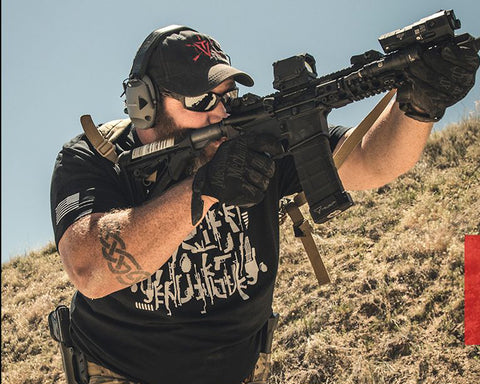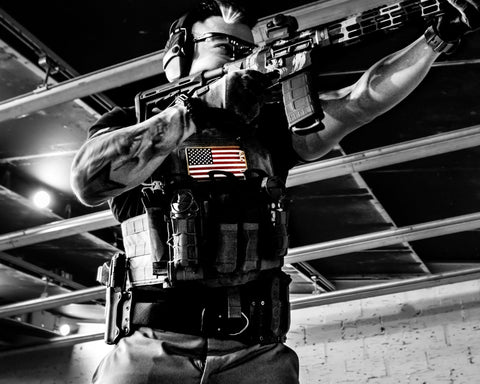We are less than 5 days away from the start of the season and I know if you’re reading this, you can’t wait. I was able to go hunting this weekend in Virginia because I had a new hunter to show the ropes (apprentice license). I was able to hunt both Saturday and Sunday and unfortunately, we didn’t get a bird this weekend. To keep things in perspective, I’ve only been hunting turkeys for a couple of years. As much as I’ve grown to love turkey hunting, it also drives me crazy with how rarely I get a turkey. In the past couple of years, I’ve made mistakes that have cost me birds on too many different occasions. This blog will serve as a reminder and guide to be a better turkey hunter than I have been lately.
Which Shotgun Choke Should I Use For Turkey Hunting?
Shotgun chokes are used to develop different patterns and with whatever pellets you’re using. You’re going to use different chokes for different types of hunts, so I understand how chokes can be a confusing thing to understand. In regards to turkey hunting, you’re going to always go with a full choke or extra full choke (also called turkey choke). There are many different types of chokes to choose from, but I use the Patternmaster 12 gauge Benelli/Beretta Mobile Code Black Turkey Choke. The reason I use this choke is the quality of metal, reduced recoil from the unique “canoe porting", and the tight pattern it gives me for every shot.
A common mistake that new hunters make is they don’t pattern their shotguns with their chokes before they hunt. I think this is asinine, reckless, and dangerous for the animal because you don’t know how or where the pellets will go. For example, I have 3 turkey chokes, and each choke patterns differently with the same shells. I’ll get into ammo next, but I always recommend patterning your shotgun with the exact ammo you’ll be using before you ever try to kill a turkey.
Which Shot Should I Use For Turkey Hunting?
When determining which shot to use, the only way to be confident and avoid a hunting disaster is to pattern your shotgun before you hunt. I have 4 types of shells that I use right now, ranging from #4 shot to #6 shot in 3" and 3.5" in length. As you choose which ammo you want to hunt with, look at your pattern and see how tight the grouping is. I always take notes on my ammo because I forget things quickly and it helps maintain knowledge and learn new things.

My favorite ammo right now is the Federal Premium Heavyweight TSS 12 Gauge 3.5in #7 2-1/4oz Turkey Shotshells. These shells are incredibly expensive and only come with 5 shells, but they’re worth every penny. Maybe it’s just by Stoeger M3500, but My patterns are always perfect with the Federal Premium shells and this specific 3.5" shell allows me to shoot accurately and safely out to 55 yards. I will most likely never take a shot that far, but it’s good to know that if I needed to, I could and still be effective without causing unnecessary suffering to the bird.
Should I Use 3" or 3.5 Shells?
This is such an important question to answer and I have found that many new hunters are afraid to ask it because they think it makes them sound dumb. I believe the size shell you use depends on too many factors to say which size shell is better. For starters, the biggest difference is a 3.5" shell is going to have more pellets, stronger recoil, further target distance, and is a longer cartridge than the 3".
If you feel you’re going to need to take longer shots and want more power, a 3.5" shell is going to be your best bet. I hunt in the deep forests with very few open areas for turkeys to congregate. I use both 3" and 3.5", but I have found that my 3.5" shells give more versatility to reach turkeys that would normally be out of range with a 3" shell. The irony of my choice is that out of the 3 overall turkeys I’ve killed, 2 of them were with the 3" Federal Premium shells and 1 was with the 3.5" shell. many people have an issue with the recoil of a 3.5" shell, which scares off a lot of hunters.
I’m not going to sit here and lie to you and tell you that a 3.5" shell doesn’t kick like a mule ( in most shotguns) and makes you think about it before you shoot. This is one reason I spent the extra money on an aftermarket turkey choke that is designed to mitigate some of that felt recoil. At the end of the day, it’s up to the hunter how much recoil he/she can handle before it becomes counter-productive. Don’t think because the felt recoil is too much with a 3.5" that it makes you less of a man/woman because that doesn’t matter if you come home with a bird. Be confident and comfortable with your choice because we’re all different and our differences are what makes us individuals.
Turkey Calls
Generally speaking, there are 4 types of turkey calls that hunters use; mouth call, box call, slate call, and push-button call. Personally, I prefer a box and slate call because I’m not great with my mouth call yet. Push-button calls are great if you don’t have time to practice because it’s as easy as tapping the button for a hen yelp. One of the mistakes I’ve made in the past is buying the cheapest turkey box call I could find ($9.99 Quaker Box Call). I’ve learned that the cheaper the call is, the harder it is to make consistent, reliable sounds. They also don’t do great in the rain if it’s cheap plywood or particleboard. My favorite type of wood is a cherry wood top with a nice hardwood base that has been sanded and finished with a protective coating.
Should I Chalk My Box Call?
I have to be honest about using chalk because I didn’t even know about it until last week. I always thought that it was just a marketing ploy by companies to get you to buy one more thing that you don’t need. However, I learned the hard way that chalk really matters and will make a huge difference in the sound of your call. I never really thought it made a difference in the sound of my calls until my brother-in-law showed me the difference between his call and mine (same brand and model).
I highly recommend chalking your turkey box call right before every time you go for a hunt in the woods. The only thing you need to consider when choosing the right chalk is to ensure you don’t use wax chalk. Chalk is designed to create more friction to give you a more consistent and gritty sounding call (more like a turkey). Wax will do the exact opposite and cause less friction with a high pitch sound that doesn’t sound like a turkey.
What Should I Wear to Turkey Hunt?
As I’ve stated in multiple blogs; turkey hunters must be in full camo from head to toe. When I was scouting last week, a turkey noticed me from the sun gleaming on my face and took off without hesitation. One of the biggest mistakes is hunters will cover everything except their hands because they think it won’t be a big deal that their hands are uncovered. I know for a fact that I’ve spooked a Tom with the glare from my pale white hands.
Hunting in the Springtime can be challenging because the weather is always rainy and the temperatures are all over the place. For example, last weekend it was 23 degrees at sunrise and it reached 65 my 11 AM. This can be very dangerous because if you’re covering ground in cold, wet temps and then heat up and continue to sweat, you can get hypothermic real quick. I recommend wearing multiple layers that are breathable, waterproof, and easy to don and doff. I wear waterproof boots and all of my outer layers are waterproof and of course camo. I’ve included a couple of ideas on what type of clothing I recommend wearing, hopefully, this gives you an idea of what to expect.
Conclusion
There are hundreds of hunters that offer thousands of tips for new and veteran hunters, alike. These tips offered today are based on my notes that I take (after-action report) and things I’ve had to learn the hard way. Hopefully, reading this blog and understanding which choke, ammo, and calls to use will help you get your dream bird. I’ve written many blogs on turkey hunting and this one should be used in conjunction with the others to form a better understanding of all the intricacies that go into turkey hunting. As always, good luck and happy hunting! Please feel free to share your thoughts and opinions with us, especially fi you get a turkey this Spring.











Leave a Reply
Your email address will not be published. Required fields are marked *